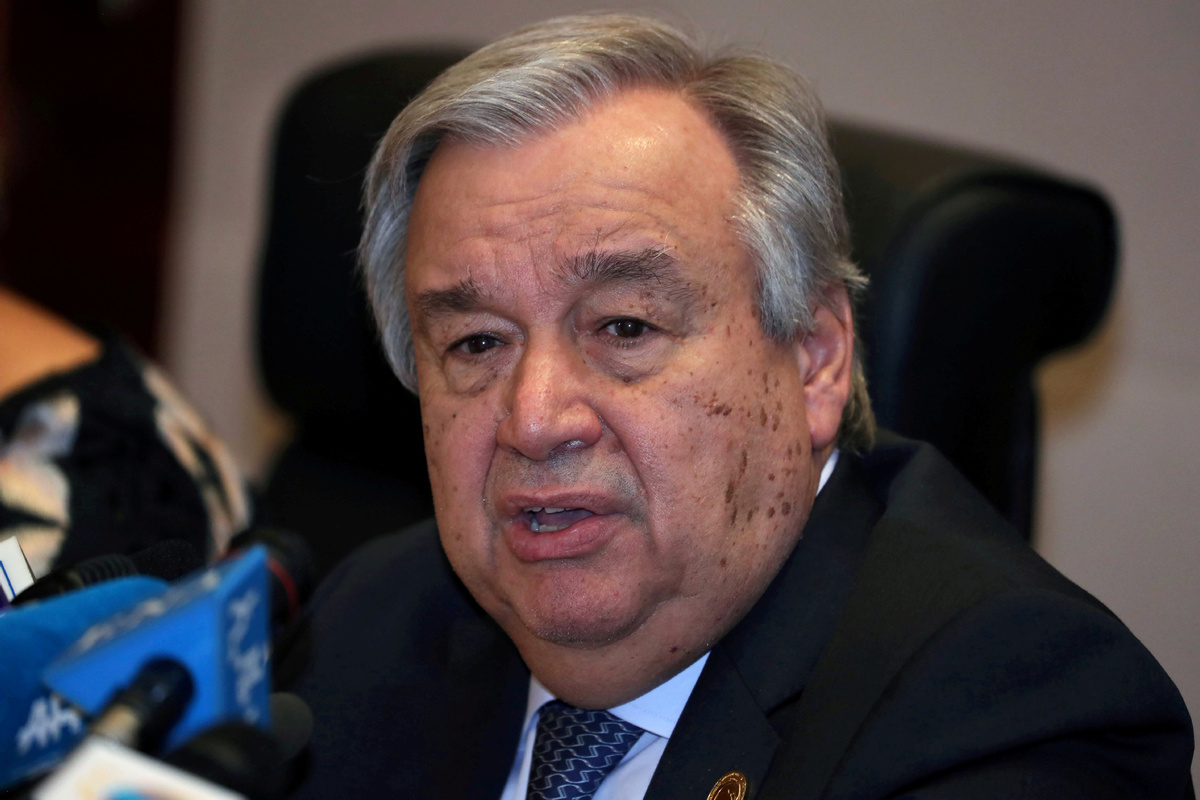COVID-19 shrinks UN HQ staff but triggers innovation
Xinhua | Updated: 2020-03-25 09:23

UNITED NATIONS - The novel coronavirus has shriveled attendance at the UN headquarters to only essential individuals and even the UN chief is working partly from home, a UN spokesman said on Tuesday.
Stephane Dujarric, spokesman for UN Secretary-General Antonio Guterres, said there had only been about 130 swipes of identification cards through security turnstiles up until just before his usual mid-day briefing, compared to about 11,000 swipes before a work-at-home order was issued earlier in the month.
While Guterres works either in his 38th-floor office or his Upper East Side, Manhattan, official residence, Dujarric said many of those working in the headquarters are technicians, such as those facilitating his daily "virtual" video-teleconference briefings.
Even meetings of major bodies of the world organization -- such as the General Assembly or the Security Council -- have been postponed or adjustments made in how they are conducted, such as via video-teleconference or a change in procedure.
As an example, Dujarric said President Tijjani Muhammad-Bande of the General Assembly proposed how the General Assembly can take essential decisions while dealing with the pandemic.
Muhammad-Bande submitted a draft decision to the 193 member states that would enable the assembly to adopt essential decisions under a silence procedure if a plenary meeting is not practical due to the pandemic, said the spokesman.
Muhammad-Bande's proposal would authorize him to circulate a draft decision of the assembly to member states under an at-least 72-hour silence procedure, Dujarric said. If the silence is not broken, the decision would be considered adopted.
The proposal, in a draft decision, is itself under the silence procedure, until noon (U.S. Eastern Time) Friday.
Ahead of the virtual -- video teleconference -- meeting of the G20 leaders, also on Friday, the secretary-general wrote a letter to them, calling for decisive action on the current global health crisis.
Guterres called for a "war-time" plan, urging G20 leaders to step forward with a strong response package to address the various threats posed by COVID-19 to demonstrate solidarity with the world's people, especially the most vulnerable.
Dujarric listed some of the other actions by UN entities taking place around the world related to the COVID-19 crisis.
The UN Economic Commission for Europe (UNECE) is launching an "Observatory on Border Crossings Status due to COVID-19," which will gather updated information on border crossing limitations worldwide, he said. The aim is to ease the work of transport operators and preserve connectivity by keeping supply chains open as much as possible.
From Geneva, the High Commissioner for Human Rights, Michelle Bachelet, said that broad sanctions should urgently be re-evaluated in countries facing the COVID-19 pandemic. These sanctions could have a potentially debilitating impact on the health sector and human rights.
With the pandemic, impeding medical efforts in one country heightens the risk for all, she said, and called for humanitarian exemptions to sanctions measures.
For his part, the secretary-general fully backs the high commissioner's sentiments, Dujarric said. "He has been in touch with a number of member states, including those who have imposed sanctions."
The secretary-general appeals to all members of the international community to facilitate and support Iran's efforts at this critical moment, the spokesman said.
The World Food Programme (WFP) is looking to pre-position buffer stocks of food or cash to provide at least three months of food assistance to vulnerable people in priority countries, Dujarric said.
The agency's main focus is to ensure that it has the resources in place to address the food and nutrition needs of 87 million people it plans to assist in 2020.
The WFP appealed to government partners to approve an estimated 1.9 billion U.S. dollars of contributions to the agency's food assistance programs. They are also asking for maximum flexibility in the way that resources are used, allowing for a dynamic response to the changing outlook.
The UN team in Kenya, led by the World Health Organization (WHO), has been working closely with the government in the response to COVID-19, the spokesman said. Experts from WHO have been integrated into the national COVID-19 technical and coordination committees since mid-January.
More than 20 UN staff members in Kenya have been seconded to government teams, including in the area of communication to help disseminate prevention messages at national and local levels.
UNICEF and other UN entities are also helping the government on emergency procurement while WHO is sourcing lab kits to increase stocks, he said.
With cases of COVID-19 now confirmed in the Democratic Republic of the Congo (DRC), the UN peacekeeping mission and the humanitarian community are mobilizing to support the government's response, the spokesman said.
Humanitarian Coordinator David McLachlan-Karr reported efforts undertaken to prevent the spread of the virus must apply throughout the national territory to help avoid a major health crisis.
In South Sudan, the UN peacekeeping mission in the country has put in place a seven-day freeze on staff traveling into the country as part of the efforts to prevent the spread of COVID-19, the spokesman said. Cargo flights into the country will continue.
























